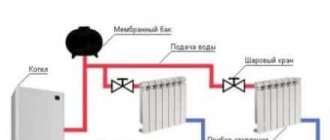The heating system in multi-apartment buildings (MCD) causes fair criticism, both in terms of the cost of the service and its efficiency. Currently, there are various options for individual heating of housing, and there are residents who prefer alternative heat sources.
After privatizing the apartment, they want to equip it according to their own wishes. They are faced with the acute question of how to abandon central heating in apartment buildings. When solving it, you will have to consider both technical and legal aspects.
Legislation
- The Housing Code of the Russian Federation defines the quality criteria for the provision of housing and communal services.
- Federal Law No. 190-FZ dated July 27, 2010 “On Heat Supply” establishes the rules of relations in the field of production, transmission, and consumption of thermal energy.
- Federal Law No. 416-FZ dated December 7, 2011 “On Water Supply and Water Disposal” regulates legal relations in the field of water resources provision, requirements for water quality and safety.
- Federal Law No. 2300-1 of 02/07/1993 “On the Protection of Consumer Rights” lists the rules of interaction between sellers (performers) and buyers.
- Decree of the Government of the Russian Federation dated May 6, 2011 No. 354 “On the provision of utility services to owners and users of residential premises in apartment buildings” names the criteria for the quality of utility resources, the procedure for their payment and provision, the responsibilities of the parties, and the practice of recalculation.
- Decree of the Government of the Russian Federation dated August 8, 2012 No. 808 “On the organization of heat supply” contains the rules for heating consumers.
What can the consumer demand?
According to Federal law, each user has the right to demand from the utility company the following:
- Provision of resources in the volumes specified in the contract.
- Timely receipt of the necessary payment information.
- Obtaining the necessary information about the quality of the services provided.
A citizen has all the rights to demand a reduction in the amount of payment for use if something is not satisfactory. For example, if the organization does not perform its responsibilities well or violates the terms of the contract.
Shutdown
Residents of apartment buildings want to disconnect from central heating for various reasons. The benefit of this solution is to reduce the cost of utility services. The law does not prohibit such changes, but it is not easy to do.
Is it possible to turn off the apartment's central heating?
If a single owner in an apartment building wants to turn off the heating, it is almost impossible to do so. The reason lies in the communications arrangement of residential buildings. The heat supply system is common to residents of all floors; it is connected through risers, pipelines, and meters. Disabling one element leads to a deterioration in the quality of the whole. To painlessly disconnect one apartment, a global redesign of the network is required. Building communications are property, the composition of which is determined by the owners and the management company.
Dear readers! To solve your problem right now, get a free consultation
— contact the lawyer on duty in the online chat on the right or call: +7 (499) 938 6124 — Moscow and region.
+7 (812) 425 6761 — St. Petersburg and region. 8 (800) 350 8362 - Other regions of the Russian Federation You will not need to waste your time and nerves
- an experienced lawyer will solve all your problems!
IMPORTANT! If the property is recognized as a common property, the decision to turn off the heating is discussed at a meeting of residents.
Here they also determine who and from what sources will pay for the redevelopment and approval of the new heat supply network. Since no one is interested in the extra costs and difficulties of restructuring the network, the decision will be negative.
In addition, regular non-payment of utility bills will work against the applicant. If there is a debt, the project will not be approved.
Is it possible to refuse to all residents of an apartment building?
It is possible for all residents to give up central heating. To do this, at a meeting of residents of the house, this issue must be put on the agenda. If the decision is made by the majority, then the procedure for drawing up and approving a new communications project begins. This looks like a renovation of a house's water circuit.
The director of the legal service “Unified Center for Protection” (edin.center) Konstantin Bobrov answers:
The law does not prohibit turning off heating for the purpose of repairing the heating system, since failure to repair can lead to even more negative consequences (breakdown of the entire system). Therefore, it is even necessary to implement it.
However, the owner of the apartment where the work will be carried out has the responsibility to carry out repairs in such a way that it causes as little inconvenience as possible for neighbors: it must be as efficient and silent as possible, a warm day must be chosen for the work, and so on.
What to do if this citizen does not respect the interests of his neighbors (for example, he carries out work in 30-degree frost)? You can complain about him to the prosecutor's office. It is advisable to attach written explanations from other neighbors to the application. The prosecutor's office will have to bring the violator to administrative responsibility. In addition, compensation for moral damage can be recovered from the culprit in court if the violation caused significant suffering. To do this, you need to prepare a substantiated statement of claim. But judicial practice shows that the amount of compensation will be small.
How to refuse according to the law of the Russian Federation
Disconnecting a home from central heating is a time-consuming and costly process. To do this correctly, it is necessary to comply with the requirements of the law and step by step go through the difficult stage of project approval.
List of questions needed to be resolved
To turn off the heating you must:
- gain the approval of neighbors;
- obtain permission for reconstruction;
- contact specialists to create a redevelopment project;
- agree on the project;
- collect a package of documents;
- technically implement the plan.
When deciding to switch to individual heating, you need to decide which one. Since clause 15 of Art. 14 of Federal Law No. 190 of July 27, 2010 “On Heat Supply” prohibits the transition to individual heating in an apartment building when using thermal energy sources, the list of which is approved by Government Decree.
Neighbor permissions
IMPORTANT! If the heating system is defined in technical documents as common property, then separating an apartment from it is considered a reduction in such property (Article 36 of the Housing Code of the Russian Federation).
In this case, the neighbors must allow the innovation; the issue is discussed at a meeting of residents.
When communications are not property of the house, the opinions of neighbors do not matter. You can immediately proceed to obtaining permission from relevant organizations. It will be necessary to make changes to the technical passport of the house.
Documentation
Article 26 of the Housing Code of the Russian Federation gives owners the right to disconnect from central communications. To do this, you need to collect a package of documents:
- Statement. It is written in free form; it needs to state the request to disconnect the apartment from centralized heating and justify it.
- Technical passport of the living space.
- Certificate of ownership.
- Written consent of adults living in the apartment.
- Conclusion on the technical feasibility of such changes.
- Coordinated reconstruction project.
Reconstruction project
The document on redevelopment of the heat supply of an apartment or house is carried out by a design organization or institute with the appropriate license on a contractual basis. To do this, use professional instructions and comply with the requirements of the law. Specialists will make calculations and monitor the effect of the apartment’s heating elements on the heating of the house.
Thermal-hydraulic calculations and calculations of residual heating from risers and sunbeds are also performed.
If, according to the results, installation of a separate boiler is possible, the project should be submitted for approval. If experts admit that canceling apartment heating will worsen the neighbors’ thermal conditions, it will not be possible to agree on the document.
Where to contact
Local government bodies - the administration of a city, town or district - are the authorities where you need to contact to obtain permission to reconstruct the heat supply system. These issues are dealt with by the department responsible for the use of housing stock. To do this, you need to provide there the collected documents and an application.
IMPORTANT! The redevelopment project is additionally coordinated with firefighters and the sanitary-epidemiological station.
After the project is approved and completed, it is necessary to invite utility services and draw up a statement stating that the service is no longer provided and there should be no charges for it.
Deadlines
The timing of the shutdown depends entirely on the wishes of the initiator, since the law places on his shoulders all the costs of re-equipping the heating system in his living space. He is also obliged to establish normal operation of the heat supply in adjacent apartments. Accordingly, the owner independently searches for project contractors, enters into an agreement with them and pays for the work. It is clear that the whole process should not occur during the heating season.
Where to complain if the heating is turned off: Can the heat be turned off in winter?
It often happens that during the heating season the heat supply stops.
When turning off the heating, the main thing is to remember your rights and obligations of the company that provides heating services. It’s one thing if there is no heating of the batteries for a couple of hours, you can survive this, but sometimes there is no heat for days, or even weeks.
What to do if the heating is turned off, where to complain? Can heating companies stop supplying heat in case of debt?
Can the heating be turned off for non-payment? Even if financial difficulties arose and it was not possible to pay for utilities, companies providing heat supply to the population do not have the right to turn off the heat supply in the winter; this is a direct violation of the law. Violations by utility organizations are quite common; it is not easy to get out of the current difficulties on your own; it is better to consult a lawyer:
- There is a state legal office where work with the population is carried out. A lawyer can help answer questions, explain the rights of the parties, and, if necessary, draw up a statement of claim in court.
- You can always use the services of a private law firm. This option will not be free, but it will be effective. Lawyers will not only help you sort out the situation, but if the client so desires, they can be present at the trial.
- Get help from an online lawyer who answers questions around the clock regarding disputes regarding the calculation of utility bills and the unlawful termination of heat supply to the apartment.
Important: If the apartment is municipal (state), in case of non-payment of utilities, residents may be evicted. Eviction occurs in accordance with legal norms; violators are required to provide housing in dormitories with an area of at least 6 m2 per person.
What consequences may arise in case of non-payment of heating bills?
Non-payment of utility bills is common. Utility organizations cannot turn off the heating without the consent of the tenant. But in case of regular non-compliance with the terms of the contract on the part of the consumer, including the accumulation of debt, the following actions may result:
- The company that supplies heat to a home can file a claim in court with a request to punish the debtor financially.
- The defendant will have to pay not only the amount of the debt, but also a penalty. The debtor is also subject to an obligation to repay court fees.
- As a rule, after a decision is made, the defendant receives a notification letter, and the case is transferred to the enforcement authority for control.
- The inspector of the enforcement organization has the right to seize the movable and immovable property of the debtor.
- If the defendant does not begin to eliminate the debt, his property may be sold, and the proceeds will be transferred to the heating company to pay off the debt.
Important: If the defendant is unable to repay the debt in one payment, then you can ask to pay the debt in installments.
When should bills be repaid?
It is clear that if the tenant does not pay the heating bills, then penalties will not be assessed immediately. The utility consumer is obliged to repay the monthly debt no later than the 10th. A warning is sent in case of debt accumulated over three months.
If, over the next three months, residents do not begin to pay their heating bills, the organization sends a statement of claim to the court, asking them to collect the debt from the debtor.
If during the process the heating was turned off for non-payment, the defendant may send a counterclaim for violations of legal norms.
Important: If the owners of the apartment pay even the minimum part of the debt within a six-month period, the utility company will not be able to file a claim in court, since the tenants will not be considered malicious defaulters.
Without a court decision, the company cannot seize property or shut off heat supply.
In what cases is late payment allowed?
The law provides for deferment of payments, write-off of penalties and fines if the tenant had compelling reasons or circumstances.
- The court considers a family income that is below the regional subsistence level as a mitigating circumstance. But it is worth considering that a low-income family can only be considered if they have a certificate of income. Such a family has the right to receive part of the write-off at the expense of state support; benefits are provided in the form of a subsidy.
- A special circumstance is also considered a delay in payment of wages that occurred through the fault of the employer.
- The court's decision also depends on the residence of young children, disabled people and dependents, this is a mitigating circumstance.
- Recent layoffs or loss of employment due to health reasons may be considered a special circumstance.
Important: The owner can apply for a subsidy, but if within two months after the benefits are issued the tenant continues to neglect his responsibilities, the claim will be sent again.
Conducting recalculation for violation of heat supply standards
Tenants may also require a recalculation in case of violation of rules or regulations for the supply of heat, gas and electricity.
An agreement is concluded between the organization and the official tenant for the provision of services for maintaining the heating systems of apartment buildings.
Legislative norms prescribe the rules for the supply of heat, which must be complied with without fail.
What to do when there are grounds for recalculation:
- In case of violation of the contract, the apartment owner has the right to demand a recalculation of the accrued amount.
- First, you need to send a complaint to the head of the organization that provides utility services. The statement clearly states the reasons for dissatisfaction, with specific references to violated clauses of the contract or laws; here it is difficult to do without the help of a lawyer.
- If the house has been disconnected from heating, then an advisable solution would be to draw up a collective statement with demands for recalculations.
- The head of the organization is obliged to consider the application and give a written response to it.
- If the tenants’ demands are not satisfied without compelling reasons and legal grounds, then you can go to court with a statement of claim.
- The organization is obliged to comply with the court order within the specified period.
Important: It is not possible to evict residents from a privatized apartment if the residents do not have other living space available.
In what cases can you count on recalculation?
There are state standards according to which heat is supplied to apartment buildings. If the temperature schedule is violated, the apartment owner has the right to refuse payment for services or demand a recalculation.
- Violation of the temperature schedule is considered a valid reason for refusal to pay for heat supply. The temperature of heated residential premises should not be lower than 180C, otherwise the owner can send a complaint to the head of the organization that supplies the heat. If the temperature does not rise to the minimum standard, the apartment owner may refuse to pay for heating services and go to court.
- The pressure in heating systems must also be maintained.
- The tenant may refuse to pay bills if the chemical composition of the water does not meet acceptable standards and harms pipes and radiators.
Important: Turning off the heat when the outside temperature is from 10 to 12 degrees is allowed for 8 hours, even in the event of an emergency. Also, the absence of heating in residential buildings is allowed for no more than a few days, depending on the population density of the area.
Holding an organization accountable
If the organization refused to comply with the court decision, then residents can re-submit the petition. In this case, the head of the organization may face administrative or criminal penalties.
- The housing inspectorate or the court can punish the organization or its leader. If facts of violation of heat supply rules or arbitrariness are established, the manager faces a fine of up to a thousand rubles. At the same time, the organization may be subject to sanctions in the amount of up to ten thousand rubles.
- Criminal penalties may follow if utility workers turn off the heating in winter or due to arbitrariness. Both the manager and his deputies may be subject to criminal punishment; in serious cases, the offender may be imprisoned for up to five years. The organization may incur a fine of up to 200 thousand. Only a court can impose such a penalty.
Important: It is better to pay utility bills on time, as this may lead to litigation and additional costs. But if the heating regime is violated by a utility organization, you should not neglect your rights to refuse payment for heat.
The conclusion remains the same for everyone: turning off the cold water supply, heating or sewage system is a direct violation that will not go unpunished.
Payment for utilities is carried out according to the agreement, so all points can be viewed in the agreement.
Taking to court is possible not only for the consumer, but also for unscrupulous organizations that violate legal standards for heat quality and temperature conditions.
about the author
Source: https://sud.guru/zhkh/mogut-li-otkljuchit-otoplenie-kuda-zhalovatsja.html
How to disconnect from individual heating in an apartment
After agreeing on the redevelopment project, you can begin its technical implementation.
Possible technical problems
When installing individual boiler equipment, you need to take into account some nuances:
- If wall-mounted boiler equipment is installed, it is located above the radiators, so it is impossible to ensure natural circulation in the system.
- It is necessary to ensure forced circulation. To do this, install a pump or boiler, into which all the elements are already built.
- The characteristics of the boiler must comply with the law: have a closed combustion chamber, an automatic safety system. The temperature should not be higher than +95°C, the pressure should not be more than 1 MPa.
- It is better to choose aluminum radiators, pipes made of plastic.
- The wiring is selected individually according to the characteristics of the apartment and the wishes of the owner.
- If it is not technically possible to shut off the riser, only the radiators in the apartment are turned off. At the same time, heat will be released from the sunbeds and risers, and you will have to pay for it.
Who disconnects
The owner should not be involved in the process of re-arranging the system on his own. Cutting batteries is not a difficult task. However, in the future, you need to install an individual heating system and rebuild the wiring - this is specialized work that is best entrusted to professionals. The costs of paying for all work are borne by the owner.
Is it possible to disconnect yourself?
If by independent shutdown we mean actions without the appropriate resolution, then this is strictly prohibited. If approval for the conversion is received, the owner must involve specialists in this process. They will make the project a reality and will not cause damage to the neighbors.
If the owner of a residential property disconnects it without permission, he will be required to restore all changes at his own expense and pay a fine.
How much does it cost
The cost of designing and re-equipping the system even in a separate apartment will be very expensive. If you take into account the whole house, the price increases significantly.
Development of the project will cost about 120 rubles. per square meter. That is, a project for an apartment of 50 meters will cost 6,000 rubles.
Individual boiler equipment and its installation are much more expensive. Here the price can vary around 100,000 rubles. depending on materials and amount of work.
If only trimming of batteries is provided, and heat will be obtained, for example, from electrical appliances, then the price will be low - about 10,000 rubles.
When calculating, you need to take into account the region, since prices for goods and services vary.
Private practicing lawyer Victoria Suvorova (Pyatigorsk) answers:
Of course, you cannot turn off the heating in winter. But here it should be noted that if this happened as a result of an emergency shutdown, that is, there was a pipe break, an accident, a flood, etc., then a temporary limitation of heating for the period of emergency work and elimination of the leak is acceptable. It is unclear from the question what incident happened to you. If the neighbor is changing the heating system, then this is incorrect. You can file complaints with the Criminal Code, Homeowners Association, Emergency Service, Heat Service, Housing Inspectorate, Prosecutor's Office, and file a lawsuit against your neighbor for compensation for moral damages and damage caused by the lack of heating in the apartment in winter.
Preventive accident
It’s cold in Omsk all January - down to minus 31 during the day, down to minus 35 at night. However, as local media report, heating and hot water in the city have been turned off en masse since the beginning of the year. The authorities said that “preventive” shutdowns are being carried out, since “in summer, during hydraulic tests, heating mains behave completely differently,” and the current defects are associated with changes in air temperature.
It is noted that such outages should last no more than six hours, during which it is necessary to dig out the problematic pipe, replace it and turn on the heat again. Utility workers said that they have to “work in extreme conditions all year round” and “preventive shutdowns are carried out as necessary.”
Heat release
View of winter Omsk
Photo: RIA Novosti/Alexey Malgavko
Frosty prospects: why residents of the Konakovsky district are freezing with new boiler houses
The village of Ruchi and the village of Gorodnya may be left without heat, although the area on paper spent more than 100 million on heating networks
Viktor Fedoruk, a leading specialist in housing law at the Housing Solidarity Foundation, notes that in winter there cannot be any preventive shutdowns.
“This is an emergency situation, there is no other option,” he told Izvestia. — It is very dangerous in winter, in severe frosts, to turn off the batteries - you can freeze the whole house.
Deputy Minister of Energy of Russia Evgeny Grabchak noted that all routine preventive shutdowns should be carried out in the summer - during the period of positive temperatures, and during the heating season, in fact, only emergency shutdowns are possible.
“If these are truly preventative shutdowns, then this is not entirely normal. Another thing is preparation for the predicted abnormal temperature conditions, Grabchak told Izvestia. — In case of prolonged, more than four days, exposure to negative temperatures, significantly exceeding the long-term average values, it is reasonable to carry out preventive measures to test the operation of the heat supply system under operating conditions at the maximum operating parameters. Preparing the network is a matter of weeks of testing with increased operating parameters of the heating network. If any problems are identified, then another day or two is needed to fix the problems.
Mishustin assessed the regions' readiness for winter
The deputy minister emphasized that the check is carried out based on average long-term temperature values, and it is better to prepare for extreme loads in advance. At the same time, Grabchak noted, there is a problem of lack of financial resources to maintain the technical condition of heat supply networks at a sufficiently high level.
“Preventive shutdowns of heat in houses in severe frost is a very strange practice,” says Pavel Sklyanchuk, an expert at the ONF’s “Housing and Urban Environment” thematic platform. “Indeed, there are six hours before such a shutdown is not recognized as an emergency in the heat supply sector. In addition, if the continuity of supply of a utility resource is disrupted, consumers are required to make a recalculation - for each hour exceeded, the cost is reduced by 0.15%.
Heat release
Photo: IZVESTIA/Andrey Ershtrem
Pelvic floor: who is happy without hot water in winter
How residents of the Ivanovo region were forbidden to use the contents of batteries and were asked to go to the bathhouse
He added that since last year, the Ministry of Construction began implementing a new system for digital monitoring of accidents - such situations will now be taken into account at the federal level “with the subsequent determination of the unpreparedness of local authorities for an accident-free passage of the heating season.”
The Omsk administration told Izvestia that during the heating season, due to sharp fluctuations and particularly low air temperatures, “heating networks are subjected to significant loads.”
“During the winter operation of networks, defects may appear in pipelines, and therefore heat supply organizations carry out preventive work in order to prevent an emergency,” the administration said. — It is not possible to determine the specific timing and frequency of damage to heat supply networks during the heating season.
It was also stated that the municipal enterprise “Teplovaya.
Central heating pros and cons
The reasonableness of using this heating option is revealed by the proximity of the heating network mains. House owners who prefer such a system take into account the advantages of centralized heat supply to the room:
- possibility of point distribution of thermal energy;
- high speed of heating of premises;
- silent operation;
- availability of installation maintenance and repair.
When choosing a heating system for a private home, you need to pay attention to the disadvantages of a centralized scheme:
- possibility of coolant leakage;
- the space for installing radiators reduces the usable area of the room;
- low air temperatures provoke freezing of the coolant in the pipeline;
- heat is distributed unevenly.
The main disadvantage of this system is its dependence on the central network. A specific schedule for turning on the heating does not allow the owner of a private house to heat the room if necessary.
The advantages of local heating in a private house with natural circulation
We change radiators without draining the water
Since 2015, the technology for freezing risers has been successfully introduced in Russia, which makes it possible to replace a radiator without draining water from the home’s heating system using press fittings. The work takes place in stages and is presented step by step in photographs.
Replacing batteries with frozen pipes... full process
Step 1. Assemble a new radiator. Install plugs and Mayevsky tap. Install transition fittings.
Step 2. Prepare the pipes for the new heating device. The pipes are cut into the required lengths. Threads are cut at their ends.
Step 3. The fittings are crimped with a special press. These are special press fittings from the German company Vega.
Step 4. Installation of the center jumper, which acts as a bypass.
Step 5. Preparing equipment for freezing pipes.
Step 6. The process of freezing pipes.
Step 7. Removing the old converter.
Step 8: Install new shut-off valves.
Step 9. Marking for the battery mounting.
Step 10. Connecting a new radiator to the riser
Reasons for replacing batteries in winter
Heating devices with running hot water can become completely unusable for several reasons, let’s look at them.
- unsuccessful battery assembly;
- errors when connecting the battery to the heating system;
- slagging of channels with contaminated coolant;
- corrosion of the metal body and its destruction;
- water hammer in a worn-out battery and its destruction.
Signs of radiator failure are:
- complete or in some places cooling of the battery;
- leaks in intersection connections, plugs and taps;
- as a result of water hammer, the section bursts;
- excessive leaks of hot water and destruction of channels.
All these cases require urgent replacement of the heating device during the heating season. If the failure of heating devices is accompanied by a slight drop in air temperature in the room, then there is no need to rush to replace the batteries. We have to wait until summer comes.
Water hammer is a sudden drop in water pressure in a heating system. It can rupture pipe joints within a fraction of a second and destroy the heating radiator itself. This phenomenon is inherent in centralized heat supply systems. Autonomous heating networks of private houses are protected by expansion tanks, where all the force of the water hammer goes.
Responsibilities of a citizen
According to the same Federal Law, the consumer also has certain responsibilities. For example, he must promptly notify the service provider of any problems if such a situation arises. The following can also be considered as consumer responsibilities:
- informing the company about how many people live in a house or apartment;
- make required payments on time;
- install all necessary metering devices and check them periodically.











